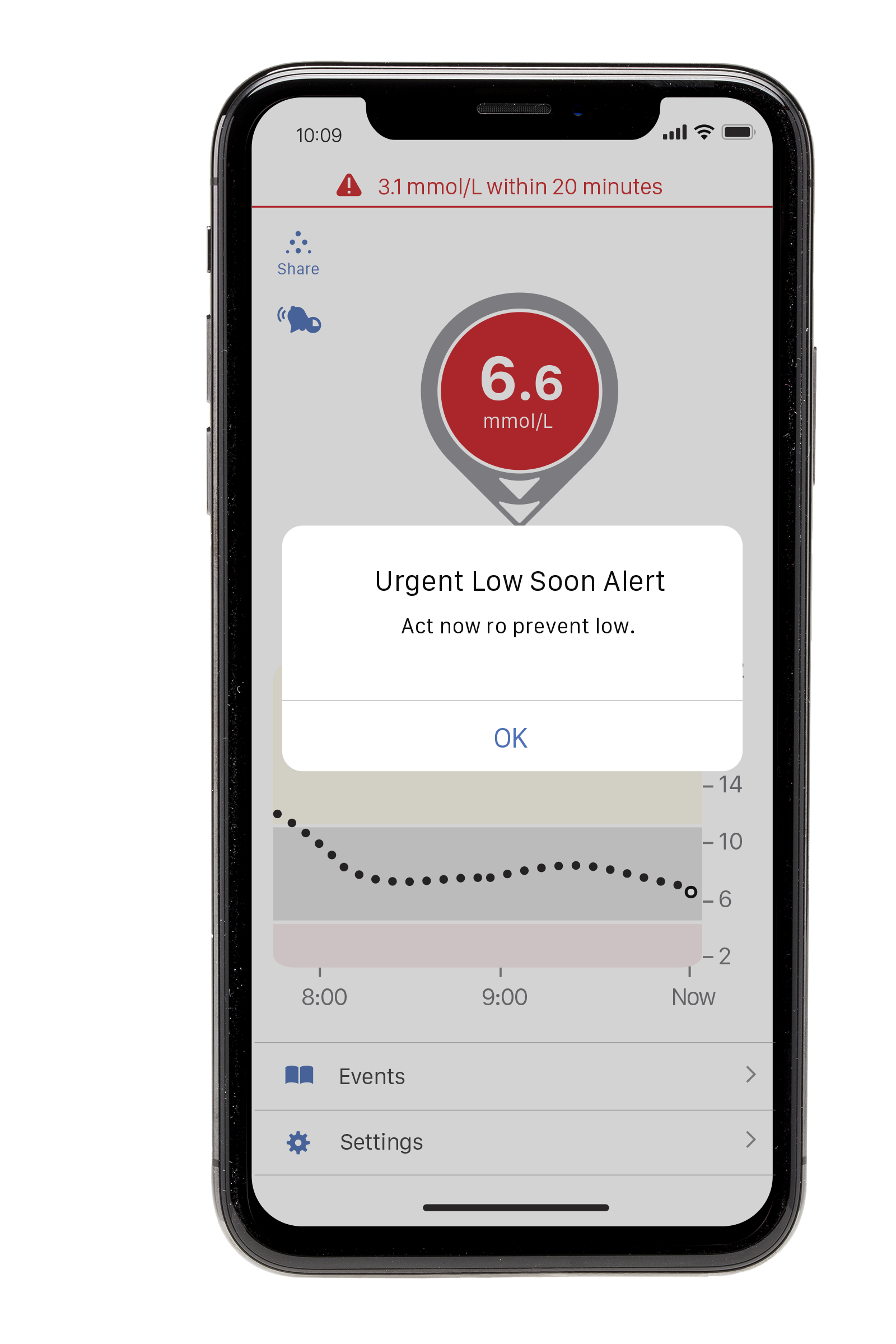Getting to Know the Urgent Low Soon Alert
For people experiencing hypoglycemic events, time is of the essence. The Urgent Low Soon alert on the Dexcom G6 real-time Continuous Glucose Monitoring (rtCGM) System helps people living with diabetes and their caregivers by providing advance notice of oncoming hypoglycemia. This exclusive feature of Dexcom G6 can mean the difference between avoiding hypoglycemia and a potentially dangerous event.
Learn more about the Dexcom G6 Urgent Low Soon alert and how it benefits people living with diabetes below.
What is the Urgent Low Soon Alert?
The Urgent Low Soon alert is a predictive alert that can warn users up to 20 minutes in advance of a severe hypoglycemic event (< 3.1 mmol/L).

Urgent Low Soon Alert vs. Fall Rates
The Urgent Low Soon alert is designed to notify users when their Dexcom G6 reading is predicted to reach 3.1 mmol/L within 20 minutes. This differs from a Fall Rate alert, which is designed to notify users when their glucose level is falling 0.11 or 0.17 mmol/L each minute at any glucose level.
Benefits of the Urgent Low Soon Alert
The Urgent Low Soon alert allows Dexcom G6 users to take appropriate action before a potentially dangerous hypoglycemic event happens. It can also help users avoid rebound hyperglycemia (RH), an aggressive carbohydrate intake beyond what’s required to restore normoglycemia.1
Supporting Evidence for rtCGM and Predictive Alerts
The 2018 HypoDE study aimed to determine whether the incidence and severity of hypoglycemia could be reduced through the use of rtCGM in patients with impaired hypoglycemia awareness or recent severe hypoglycemia.2 The study concluded that rtCGM use reduced the number of hypoglycemic events in individuals with type 1 diabetes by an average of 72%.2
A recent study further investigated the associations between rebound hyperglycemia (RH), use of real-time continuous glucose monitoring (rtCGM), and an rtCGM system’s predictive alert (such as Urgent Low Soon). The study analyzed data of patients from the HypoDE study, as well as data of real world users who transitioned from a rtCGM without predictive alerts to a system with predictive alerts and enabled the feature.1 In their analysis, the study found that compared to RH events in the HypoDE baseline study phase,1 the mean frequency, duration, and severity of RH events fell by 14%, 12%, and 23% respectively in the follow-up phase (all P < .05). For those who transitioned to using a predictive alert, mean frequency, duration, and severity of RH events fell by 7%, 8%, and 13%, respectively (all P < .001).
Read the Mitigation of Rebound Hyperglycemia Study
Who Should Use rtCGM and Features like Urgent Low Soon
In the 2021 update of the Clinical Practice Guidelines for Blood Glucose Monitoring in Adults and Children with Diabetes, Diabetes Canada recommends rtCGM use as follows:3
- For people living with type 1 diabetes on basal-bolus insulin or an insulin pump, rtCGM should be used to reduce A1C and increase time in range, and reduce the duration and incidence of hypoglycemia. (Grade A, Level 1A evidence)
- For adults living with type 1 diabetes with impaired awareness of hypoglycemia or recent severe hypoglycemia, rtCGM should be used to reduce incidences of hypoglycemia and severe hypoglycemic events compared with capillary blood glucose (CBG) testing (Grade A, Level 1A evidence). rtCGM is also recommended to reduce time in hypoglycemia compared with intermittently scanned CGM (isCGM) systems (Grade B, Level 2 evidence).
- For people living with type 2 diabetes on basal-bolus insulin not achieving the A1C target, rtCGM may be used to reduce A1C and the duration of hypoglycemia (Grade A, Level 1A evidence).
Learn more about the Diabetes Canada Clinical Practice Guidelines on Blood Glucose Monitoring in Adults and Children with Diabetes, updated for 2021.
1 Acciaroli G, Welsh JB, Akturk HK. Mitigation of Rebound Hyperglycemia With Real-Time Continuous Glucose Monitoring Data and Predictive Alerts. J Diabetes Sci Technol. 2022;16(3):677-682.
2 Heinemann L, Freckmann G, Ehrmann D, et al. Real-time continuous glucose monitoring in adults with type 1 diabetes and impaired hypoglycaemia awareness or severe hypoglycaemia treated with multiple daily insulin injections (HypoDE): a multicentre, randomised controlled trial. Lancet. 2018;391(10128):1367-1377.
3 Diabetes Canada Clinical Practice Guidelines Expert Committee. Diabetes Canada 2018 Clinical Practice Guidelines for the Prevention and Management of Diabetes in Canada. Can J Diabetes. 2018;42(Suppl 1):S1-S325.
LBL-1001627 Rev001
